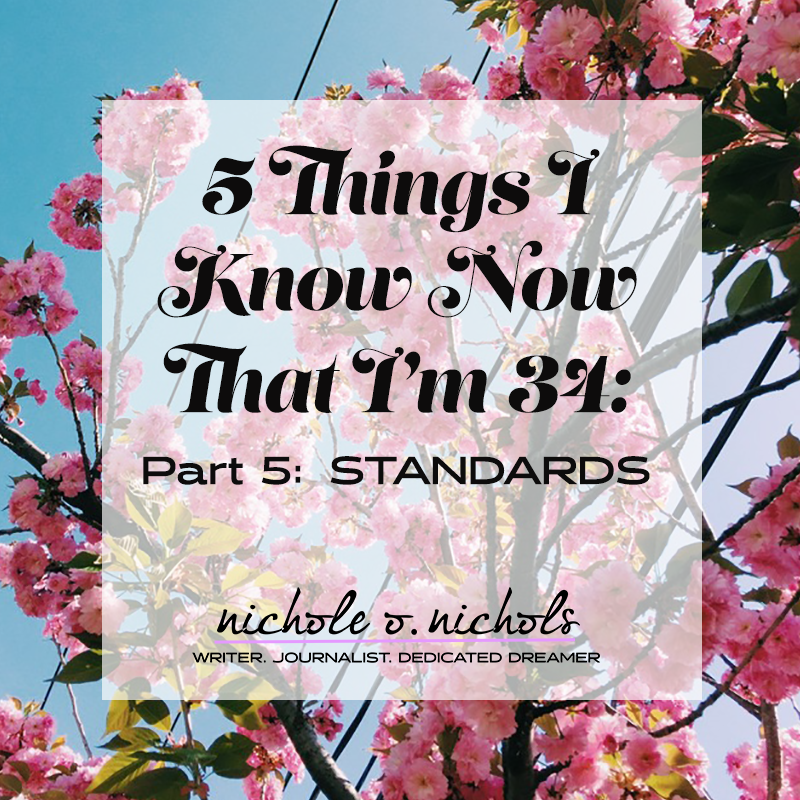 Over the years, I have been a victim of my own wavering standards. They sank for various reasons, but primarily because of my need to feel liked, and the need to feel liked necessitated the need to appease through edits to my standards.
Over the years, I have been a victim of my own wavering standards. They sank for various reasons, but primarily because of my need to feel liked, and the need to feel liked necessitated the need to appease through edits to my standards.
I think my teaching experiences, which I glazed over in the first post in this series, illustrate this best. I started teaching 6th grade in my early twenties right after I graduated from undergrad. After an interview with the principal of only one school, I was excited to start a career as a middle school teacher. When I told people the name of the school where I was assigned to teach, I got reactions that ranged from a blank face to looks of pity. The school where I would work for that next year was known as one of the hardest schools in the county at which to teach. At a meeting for new teachers that was held a few days before my first day of class, one of the veteran teachers at this school described how she sat in her car every day before school vomiting in a McDonald’s cup due to the nervous tension that she would build up as she anticipated what the school day held for her. I later learned that this particular teacher was known to be overly dramatic, but that was still a hell of a way to welcome new teachers to the school.
The year started pretty well, despite the vivid warning from the drama queen teacher in the new teacher’s meeting. My students seemed to be interested and engaged by what I was teaching, and I didn’t experience any behavior problems or disrespect in the beginning. Bit by bit, that started to change.
I didn’t want to be known as the “mean” teacher, so I made the mistake of deliberately overlooking what started as small behavior infractions. I’d talk a little louder over a couple of girls having a hushed conversation while I was teaching. I didn’t say anything when a student blurted out an answer or talked over another student. Things went downhill from there. I had students literally running across bookcases, fighting, and cussing at me in my class every day. I wasn’t vomiting in a fast food cup before school, but I became worn down to the point that started to cry in the shower as I got dressed for work most days. Needless to say, I didn’t stay in K-12 education for long.
Although the attention and behavior disorders that many of my students had explained much of what I experienced, I complicated the situation because my actions communicated to the students that regardless of what I said the standards were, in reality, they could get away with whatever they wanted.
I’ve learned that adults don’t operate much differently than those 11 and 12 year-olds did in that 6th grade classroom. Take these 5 lessons to heart when you deal with difficult romantic relationships, friendships, family relationships, and work relationships:
Settling is one of the most dangerous things you can do.
We all end up at a point where we have to make a decision between settling for a certain circumstance or holding out for what we really want. Of course, what we really want usually requires more from us: more time, more work, more patience, more consistency, more discipline. Settling is choosing the easier thing, the more comforting thing, the thing that makes less waves. Settling is also a setback. We all know people who used the better balance of their lives trying to make up for an instance when they settled for something they didn’t want or a situation that they didn’t want to be in. The danger of settling is the loss of self that happens in the process. No one ever settles because it’s best for their authentic selves. We always settle to appease and soothe others, and sometimes even ourselves. Don’t make that mistake. Ride the waves, no matter how rough they may be.
We always settle to appease and soothe others. Ride the waves, no matter how rough they may be.
(Click To Tweet)
Your standards are whatever you accept.
Women tend to have a litany of things that we say we won’t put up with in our relationships with men, our families, and our careers, but after the right words are said or the right head fakes are given, some of us stand back and allow our standards to crumble in exchange for a few feel-good moments, even if that good feeling is just avoiding criticism or conflict. Doing this over time takes the power to define our own standards from our hands and places it in the hands of people who usually don’t have our best interests in mind. Our standards mold the quality of life that we live, and when you accept less from people, you are allowing them to lower your quality of life.
Standards mold the quality of life that we live. When you accept less from people, you are allowing them to lower your quality of life.
(Click To Tweet)
Raising standards may mean losing some people, habits, things.
When you start to raise your standards to reflect the quality of life you want to live, people, habits, and things that don’t align with those standards fall away. This is a great opportunity to replace these things with people, habits, and things that help you to enforce your standards, make you a better person, and help you to achieve your goals.
It’s easier to lower standards than it is to raise them.
If you know your standards have been lower than they should have been for a long period of time, expect to meet a lot of opposition when you decide to raise them. There are people around you who benefit from you staying in a low place, and your decision to raise your standards for yourself and the people you choose to keep around you might not work well for them if it disrupts their comfort. Being the nice, non-confrontational one who saves the day for everyone seems easier in the beginning, but once you make a change to your standards and show that you are serious about being consistent with enforcing those standards, you’ll actually gain respect. And that’s the thing…no one really respects the nice, non-confrontational one who swallows her own needs and wants for everyone else. Manipulative folks like to blame her for “allowing” herself to be used. I know that’s foul, but you can avoid all of that by not making exceptions for anyone when it comes to your standards. F-boys and f-girls are naturally repelled by consistently enforced standards.
Standards aren’t just about how you interact with others. They’re (more importantly) about how you hold yourself accountable.
The truth is that your standards are more about keeping yourself in line than they are about keeping other people in line. We all know people who brag about how high their standards are, yet we see these same people violate said standards multiple times daily. You can’t expect people to respect standards that you don’t respect yourself. Focus inward when you are outlining what your new standards will be. What behaviors will you no longer tolerate from yourself? What behaviors will you now expect from yourself with no excuses? For the most part, your standards should be communicated to others non-verbally through the way your discipline reflects in the way you carry yourself. Think of someone who has an impeccable aura that you admire. The building blocks of that aura are his or her standards.
Standards should be shown to others nonverbally through the way your discipline reflects in the way you carry yourself.
(Click to Tweet)
What standards in your life do you consistently enforce? Which ones do you need to work on?
Links to Parts 1-4 of this series:
5 Things I Know Now That I'm 34, Part 1: Push
5 Things I Know Now That I'm 34 Part 2: Time
5 Things I Know Now That I'm 34, Part 3: Living
5 Things I Know Now That I'm 34, Part 4: Hold On
If you want writing tips and inspiration to come straight to your email, sign up for #TheLushLitLife Newsletter! As a free gift, you’ll get my Daily Writing Checklist printable and my Weekly Writing Business Planner printable. Just click the link!
Send me writing tips, inspiration, and my free gifts!


